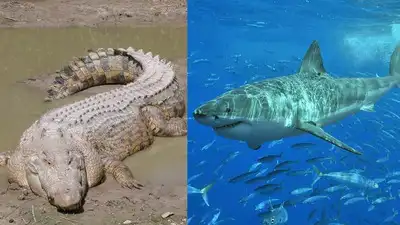ARTICLE AD BOX

The saltwater crocodile and the great white shark are two of the most fearsome predators in the animal kingdom. Each rules its own territory where on the one hand, the crocodile dominates the rivers and coastal swamps, on the other side, sharks are famous for reigning over the open ocean.
Both are apex hunters, built for power, stealth and lethal efficiency. In a rare and deadly encounter, one might overpower the other. By comparing their size, strength, hunting strategies and natural weapons, we explore the possibilities of this epic battle between two of nature’s most formidable and iconic creatures each evolved to survive and dominate in its own aquatic domain. There are multiple characteristics that make them different from each other.
How do saltwater crocodiles and great white sharks differ
| Category | Saltwater Crocodile | Great White Shark |
| Physical Characteristics | Massive reptile up to 6 meters long, around 1,200 kg. Tough, armored skin and extremely strong jaws designed to crush prey. | Can grow up to 6 meters, weighs up to 2,400 kg. Sleek, streamlined body built for speed. Jagged teeth for slicing flesh and powerful tail for fast bursts. |
| Hunting Skills | Ambush predator; waits patiently near water’s edge, then strikes explosively. Uses strong jaws to grab and drag prey underwater; performs “death roll” to tear prey apart. | Uses speed and surprise; detects prey with keen senses. Attacks from below with fast, powerful strikes. Bites and releases, then waits for prey to weaken. |
| Natural Habitat | Lives in shallow coastal waters, rivers, estuaries, and mangroves in Southeast Asia, northern Australia, and India. Thrives in both freshwater and saltwater, stays near shores. | Found in cool to temperate coastal waters worldwide. Prefers open oceans and continental shelves. Highly migratory, covering large distances. |
| Intelligence and Instinct | Highly intelligent reptile with problem-solving skills and strategic hunting. Uses tools like sticks to lure prey and patiently waits to ambush. | Relies mostly on instinct but has highly developed senses (electrical detection, smell). Can adjust hunting strategies using surprise and speed. |
| Historical Encounters | Rare encounters with sharks in overlapping coastal areas; typically avoid direct conflict. Both predators cautious to avoid injury. | Same as crocodile; encounters rare and usually marked by avoidance rather than fight. |
| Survival Traits | Tough armored skin protects against attacks; can hold breath underwater for long periods; powerful jaws and endurance to overpower prey. | Relies on speed, agility, acute senses (electrical detection, blood sensing); strong immune system; continuously replaces teeth. |
| Who Would Win a Fight | Advantage in shallow, murky coastal or river mouth waters due to camouflage, armor, and crushing bite. Effective at close range with “death roll.” | Advantage in deep, open ocean waters with speed, agility, and hit-and-run attacks. Depends heavily on environment; winner varies by location. |
Saltwater crocodile vs. great white shark
Physical characteristics
The saltwater crocodile is a massive reptile measuring up to 6 meters long and weighing around 1,200 kilograms with tough, armored skin and incredibly strong jaws designed to crush prey. In contrast, the great white shark can grow up to 6 meters as well but is lighter up to 2,400 kilograms with a sleek and streamlined body which is built for speed. Its jagged teeth are made for slicing flesh, while its powerful tail allows fast bursts of movement.
Both predators are built for killing, but the crocodile relies on brute strength and armor while the shark depends on speed and sharp teeth.
Hunting skills
The saltwater crocodile is an ambush predator that relies on stealth and patience. It waits quietly near the water’s edge then strikes with explosive power by using its strong jaws to grab and drag prey underwater. Crocodiles often perform a “death roll” to tear apart their catch.
In contrast, the great white shark uses speed and surprise, detecting prey with keen senses before launching fast, powerful attacks from below.
Sharks typically bite and release waiting for their prey to weaken before feeding. While the crocodile relies on brute strength in close quarters, the shark depends on agility and precision in open water.
Natural habitat
The saltwater crocodile inhabits shallow coastal waters, rivers, estuaries, and mangrove swamps across Southeast Asia, northern Australia, and parts of India.
It thrives in both freshwater and saltwater environments, often staying near shores where it can easily ambush prey. In contrast, the great white shark lives mostly in cool to temperate coastal waters around the world, favoring open oceans and continental shelves.
While crocodiles tend to stay close to land and slow-moving waters, great whites are highly migratory, covering vast ocean distances in search of food and breeding grounds.
Their habitats rarely overlap making encounters uncommon.
Intelligence and instinct
Saltwater crocodiles are among the most intelligent reptiles for showing problem-solving skills and strategic hunting tactics. They can use tools, like balancing sticks to lure birds and they even patiently wait for hours to ambush prey. Their intelligence helps them adapt to different environments and prey. Great white sharks rely mostly on instinct but have highly developed senses like detecting electrical signals and smelling blood from afar that guide their hunting.
While sharks don’t show problem-solving like crocodiles, they can adjust their attack strategies, using surprise and speed to catch prey. Both rely on sharp instincts and specialized skills to survive as top predators.
Historical encounters
Encounters between saltwater crocodiles and great white sharks are very rare due to their different habitats. When they do meet such as in coastal areas where rivers meet the ocean, they usually avoid direct conflict.
Generally, both predators prefer to avoid injury, any of these rare interactions highlight the power and caution both animals use to survive in their overlapping territories.
Survival traits
Both the saltwater crocodile and the great white shark possess remarkable survival traits that help them thrive as apex predators. The crocodile’s tough, armored skin provides strong protection against attacks while its ability to hold its breath underwater for long periods allows it to ambush prey silently.
Its powerful jaws and endurance make it capable of overpowering large animals. The great white shark’s survival depends on its speed, agility and acute senses, including an extraordinary ability to detect electrical signals and blood in the water.
Sharks also have a strong immune system and continuously replace their teeth ensuring they remain effective hunters. Together, these traits make both species highly resilient in their environments.
Who would win a fight
In a fight between a saltwater crocodile and a great white shark, the outcome would largely depend on the environment and circumstances. In shallow, murky waters near the coast or river mouths, the crocodile’s armored body, powerful bite and ambush skills give it a strong advantage. It can use its environment to hide and strike with brutal force. However, in deeper, open ocean waters where speed and agility matter most, the great white shark would likely dominate with its fast swimming, sharp teeth and hit-and-run attack style.
If we weigh the chances, the saltwater crocodile might have the upper hand in shallow, coastal waters or river mouths where it can use its camouflage, strong bite, and armored skin to its advantage. Its ability to grab and hold prey with a crushing bite, plus the deadly “death roll,” makes it a fearsome opponent up close. So, the crocodile has better odds in confined, shallow environments, while the shark dominates in the open sea. The winner really depends on where the fight takes place.Also read: Chimpanzees vs. Bonobos: How they differ on the basis of size, characteristics and more



.png)
.png)
.png)
















 1 week ago
4
1 week ago
4









 English (US) ·
English (US) ·